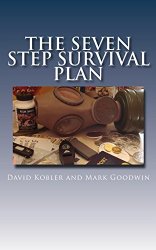10 Things Every 72-Hour Kit Should Contain
Today’s post is a guest post from Chett Wright at Food Insurance. I hope you learn a lot from the article and check out all the great deals at FoodInsurance.Com
10 Things Every 72-Hour Kit Should Contain
There are so many everyday services that we tend to take for granted. That is, until a disaster strikes. When this happens, we’re often left without electricity, gas, running water, telephones, etc… Emergency preparedness experts know this. That’s why they advise that we be prepared to live self-sufficiently after catastrophes for at least three days.
Every household should have an emergency 72 hour kit. It should be stored in an area that’s easily accessible. Your 3-day kit should also be easy to move. Some preppers prefer to keep their kits in a backpack or a tote bag with wheels.
10 Things You Must Put in Your 72 Hour Kit
If you’ve decided to put build your kit yourself, you need to make sure that everything in the list below is in your kit. Even if you purchase a ready-made 72 hour kit, you need to do an inventory. Make sure these ten things are included:
1. Water – The recommended amount is one gallon of water, per person, per day.
2. Water Purifier – If you need to evacuate your home, it will be very difficult toting around gallons of water. Pack some type of water purifier or filter to ensure that you have clean water when needed.
3. Food – Make sure that the foods you choose for your 72 hour kit are non-perishables. You won’t be able to refrigerate or freeze your food. Some good suggestions are canned foods and freeze dried foods. Both have very long shelf lives and can be consumed without cooking.
4. Cooking Supplies – Be prepared to cook after a disaster with a stove-in-a-can, a sun oven, volcano stove, etc… If you don’t have access to any type of portable stove, you will still need other supplies, such as a manual can opener, if you plan to store canned foods.
5. Eating Utensils – If your food storage is filled with canned foods, all you really need are a few utensils. However, it would be great if you added some plates, bowls, serving spoons, etc…
6. First Aid Kit – Make sure that your first aid kit has the instructions with it. Basic first aid techniques could actually save lives until help arrives.
7. Important Documents – Some of these include a list of important phone numbers, birth certificates, passports, cash money, etc…
8. Clothing – Be sure there’s enough warm clothing, rain gear, heavy shoes and work gloves for everyone in the home. Remember, you’re planning for three days.
9. Personal Hygiene – Don’t forget the simple necessities, such as toilet paper, hand sanitizer, soap, deodorant, toothpaste, toothbrushes, feminine supplies, baby supplies, etc…
10. Warmth – In situations like these, who knows where you may have to sleep? Make sure you’re warm at night with a thick sleeping bag or heavy blanket.
Author Bio
This content was provided by Chett Wright an expert in emergency preparedness. Get your 72 hour kit from the industry leaders today.
Happy Prepping!













































